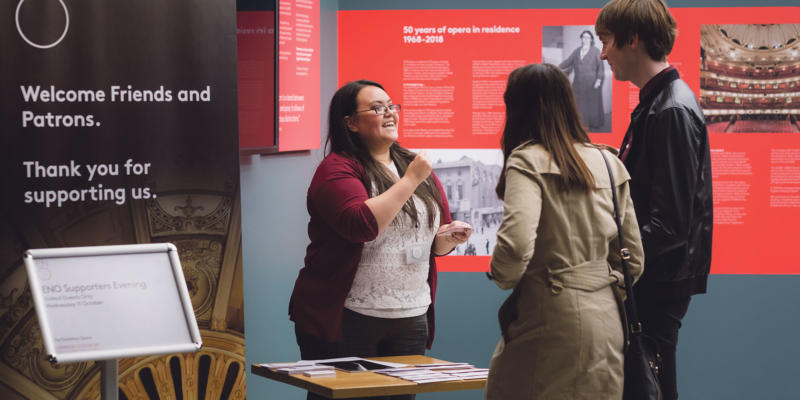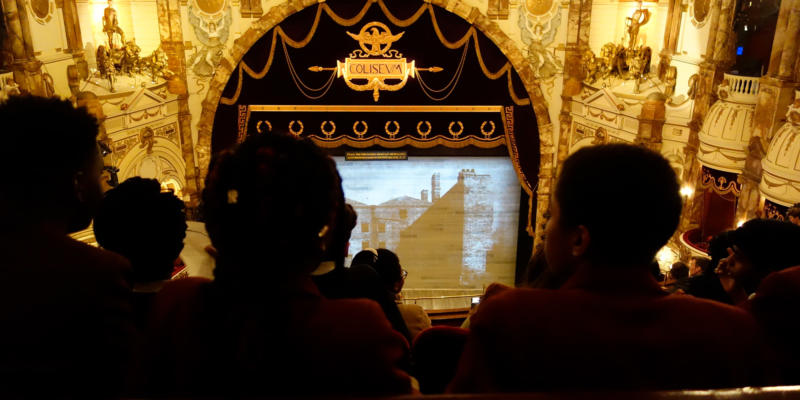Best Gilbert & Sullivan Songs
Gilbert and Sullivan make up one of the best known composer/lyricist pairings in operatic history.
Collaborating on 14 operas during their partnership, famous Gilbert and Sullivan operas The Mikado, Pirates of Penzance, The Yeomen of the Guard and H.M.S. Pinafore. Their output is massive, with many of their songs being extremely popular in their own right. Below you’ll find our little list of Gilbert and Sullivan songs that WOULD be missed!
If you’re unfamiliar with the pair, you can learn more about them you can learn more about the operatic duo and their world famous comic operas in our Beginner’s Guide to Gilbert and Sullivan.
The Major-General’s Song (Pirates of Penzance)
‘In short, in matters vegetable, animal, and mineral
I am the very model of a modern major general!’
Video
No Gilbert and Sullivan song list is complete without the ‘Major-General’s Song’ (also known as ‘I Am the Very Model of a Modern Major-General’) from 1879’s The Pirates of Penzance.
Popularly thought to be a caricature of the well-known general of the late-19th century Sir Garnet Wolseley (who was rather fond of the comparison), the Major-General’s Song satirises the idea of the ‘modern’ over-educated British Army general of the period.
Appearing towards the end of Act 1, the Major-General introduces himself to the titular Pirates before appealing to their good natures when they threaten to marry his daughters, which would leave him alone in his old age.
The song itself is a patter song, characterized by a reasonably fast (to very fast!) tempo, with a strong emphasis on rhythmic syllabic (one syllable to one note) singing. Gilbert and Sullivan were well known for their skilled writing of patter songs – with some of them listed below!
Probably the best known G&S aria, the Major-General’s Song has been parodied extensively, with versions listed from Doctor Who (‘I am the very model of a Gallifreyan buccaneer’), to The Muppet Show, Frasier and and even as a way to remember the periodic table in Tom Leher’s parody titled ‘The Elements’. .
In this version you can see Andrew Shore play the daunting Major-General in full form!
I’ve got a little list (The Mikado)
‘As some day it may happen that a victim must be found
I’ve got a little list — I’ve got a little list
Of society offenders who might well be underground
And who never would be missed — who never would be missed!’
Video
Also known as ‘As some day it may happen’, this is one of the most popular Gilbert and Sullivan patter songs. Featured in The Mikado is sung by Ko-ko, a tailor at the beginning of our story who finds himself suddenly raised to the rank of Lord High Executioner. Ko-ko attempts to prove himself by reading a list of undesirables who may find themselves losing their head (rather literally), as they ‘would not be missed’.
Whilst ‘The Major General’s Song’ is often changed when parodied externally, ‘I’ve got a little list’ is often changed within productions of The Mikado itself. The song serves to parody the political climate, popular culture and regional happenings of the time, and undoubtedly the humour of the original production in 1885 is unlikely to translate fully to the audiences of today. It also creates an opportunity to poke fun at current affairs, and as such is a favourite of G&S fans, whop anticipate new production’s take on recent events.
Our version of The Mikado has ‘I’ve got a little list’ sung by Richard Suart (who has an over twenty-five-year association with the character of Ko-Ko in ENO productions), who mocks David Cameron, ENO Screen cinema viewers, and a certain American president, amongst others.
Of course,‘I’ve got a little list’ is subject to parody as well, with mentions from Family Guy to Isaac Asimov.
A British Tar (H.M.S. Pinafore)
‘A British tar is a soaring soul,
As free as a mountain bird,
His energetic fist should be ready to resist
A dictatorial word.’
Video
Describing the perfect nautical crewmate, this key H.M.S Pinafore song (also known by its full title ‘A British Tar is a soaring soul’) is an ensemble performance featuring the characters Ralph, Boatswain and Carpenter singing a round of the individual attributes one must have to perform his job best (including ‘And his heart should glow, and his fist be ever ready for a knock-down blow’). Not only this, they describe the less desirable qualities in a sailor: He never should bow down to a domineering frown, or the tang of a tyrant tongue.’
The song alternates between fugue-like interweaving melodies and much faster repeats of the chorus in unison, finishing with stressing that his ‘customary attitude’ should take precedent. Lyrical strings give way to a light accompaniment, with sections being sung entirely a capella – confident singers are needed for this one!
Notably featured in 1998’s Star Trek: Insurrection, where members of the crew sing part of “A British Tar” to distract a malfunctioning synthetic life-form. Who knew Gilbert & Sullivan arias had so many uses?
Nightmare Song (Iolanthe)
‘Love, unrequited, robs me of my rest:
Love, hopeless love, my ardent soul encumbers:
Love, nightmare-like, lies heavy on my chest
And weaves itself into my midnight slumbers!’
Video
The first Iolanthe song featured on our list is also referred to as The Peer and the Peri, but is more commonly known as the Nightmare Song. It depicts The Lord Chancellor being kept awake by night terrors caused by his unreciprocated love for Phyllis, a shepherdess who is in love with another of the trade, the handsome Strephon. Staged as the Lord Chancellor having just awoken, the character is dressed in his comical bedclothes, with the libretto giving us the direction of ‘Enter Lord Chancellor, very miserable’ – it appears that lost love doesn’t agree with him.
The song itself could be interpreted as a hypochondriac’s worst nightmare, with the Lord Chancellor worrying over various ailments both physical and mental, before segueing into descriptions of various dreadful travels and scenarios that unfold in a nonsensical fashion. Despite the majority of the song featuring the Chancellor’s complaints, the link to the ongoing plot is the short recitative before the patter begins, where ‘Love, unrequited, robs [him] of [his] rest’.
The version of the ‘Nightmare Song’ you see here is from the 2018 ENO production of Iolanthe, sung by Andrew Shore as Lord Chancellor.
My eyes are fully open (Ruddigore)
‘My eyes are fully open to my awful situation
I shall go at once to Mabel and I’ll make her an oration.
I will tell her that I’m bound by duty and by moral senses
and I don’t know what to do about the pending consequences.’
Video
Found in 1887’s savoy opera Ruddigore, this number differs from the previously mentioned songs by featuring a patter song sung by a trio. Also known as The Witch’s Curse, Ruddigore concerns a Cornish family (the Murgatroyd family) beset by the curse of Ruddigore, for which they must commit a crime every day or die in agony after their ancestor is cursed by a persecuted witch. Despite this, the opera revolved around the various love triangles and farces the curse causes, instead of the curse itself.
Sung by the characters Despard (the curse-afflicted Murgatroyd), Sir Ruthven (formerly disguised as the young farmer Robin Oakapple to avoid his familial affliction, whose title has been restored) and ‘Mad’ Margaret, the wife of Despard who she was previously obsessed with, this patter song comes just after Margaret and Despard have confronted Ruthven about the curse’s consequences, and that he is responsible for the crimes Despard committed while he hid. Ruthven resolves to defy the Witches’ Curse, and stand against the ghosts of his ancestors, whatever the consequences.
The popularity of the aria was reinforced, when in the revised Overture of Ruddigore (orchestrated by Geoffrey Toye in 1920), ‘My eyes are fully open’ was included in the pieces showcased, whilst it was absent in the original versions of the Overture. Evidently audiences were sufficiently enamoured with the piece to warrant this change – as it became one of the best loved Ruddigore songs.
Tripping Hither, Tripping Thither (Iolanthe)
‘We are dainty little fairies,
Ever singing, ever dancing;
We indulge in our vagaries
In a fashion most entrancing.’
Video
Iolanthe opens to the chorus of Fairies, along with the trio of fairies Celia, Leila and Fleta, giving the audience exposition to the backstory of the realm: after the well-loved fairy Iolanthe marries a mortal, she was banished from the kingdom, and forbidden to ever see her husband again. Iolanthe lives away from the fairies, having birthed a son from her marriage, and is still missed by the fairies, who beg their Queen to pardon her from exile.
‘Tripping Hither, Tripping Thither’ precedes even this, with the fairies’ introduction onto the stage after the Overture. The short song describes the nature of the fairies, a race whose jubilant and careless nature depends on the existence of lovers, who provide the sustenance needed for their survival. In the latter half of the song, Leila lists the ways that the fairies use lovers, including ‘Bathe ourselves in lovers’ tears, Clothe ourselves with lovers’ fears’; Iolanthe’s fairies aren’t our usual fantasy affair!
Watch the above video to see ‘Tripping Hither, Tripping Thither’ from our 2018 production of Iolanthe, featuring Llio Evans and Joanne Appleby as Celia and Leila, or discover more about this famous Gilbert and Sullivan opera in our Introduction to Iolanthe.
Three Little Maids (The Mikado)
‘Three little maids from school are we
Pert as a school-girl well can be
Filled to the brim with girlish glee
Three little maids from school’
Video
‘Three Little Maids’ from The Mikado introduces the trio of Ko-Ko’s wards: Yum-Yum, Pitti-Sing, and Peep-Bo. The most important to the plot is, of course, Yum-Yum, who has garnered the attention of Nanki-Poo (the son of The Mikado), as well as Ko-Ko himself.
Highlighting the childish joy of the schoolgirls and their curiousity, they go on to sing about Yum-Yum’s betrothal to Ko-Ko, who’d orchestrated their marriage for later in the day (‘From three little maids take one away/ two little maids remain and they/ won’t have to wait very long they say’).
The short length of the song, along with its catchy melody and close harmonies have led to it being one of the most featured/parodied of The Mikado songs on shows such as Frasier, The Simpsons, and The Animaniacs.
Be an ENO Friend

Access exclusive discounts on tickets and enjoy members-only rehearsals, talks, recitals and parties for just £65/year.
Ways to save

Brilliant experiences at affordable prices. Our Under 35s scheme where 21-34 year olds get discounted tickets and Under 21s come free.
Multi-buy Package

Choose to see more than one ENO opera and save money on seats in the Upper Circle, Dress Circle and Stalls with a Multi-Buy Package.



